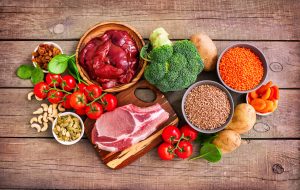


Medically reviewed by Dr. Sim Hsien Lin, Consultant General Surgeon (Colorectal Surgery)

Iron is a necessary component for numerous bodily functions. One such example is the synthesis of haemoglobin, DNA, and other enzymes in the body that stimulate different chemical reactions. Haemoglobin, an iron-rich protein found in red blood cells, is essential for carrying oxygen from the lungs to be distributed to different body organs.
Anaemia is a condition when low levels of haemoglobin are caused by iron deficiency. Without treatment, anaemia can be life-threatening as it can deprive the heart and other essential organs of oxygen. Other symptoms like exhaustion, hair loss, and memory loss may develop and impact your quality of life.
Iron deficiency anaemia can be caused by any interference with the processes during iron metabolism, such as absorption, transport, storage, and use. Those who have experienced significant blood loss from cancers, ulcers, heavy periods and even pregnant women are more likely to experience iron deficiency because their bodies require more iron than usual.
In the early stages, iron deficiency can be so mild that it goes unnoticed. But as the body becomes more deficient in iron and the condition worsens, signs and symptoms will intensify.
The most common symptoms of iron deficiency include:
Less common symptoms include:
If you experience signs and symptoms that suggest iron deficiency, you should consult a doctor. It is important to see a doctor for an accurate diagnosis through blood tests, other evaluation and treatment instead of taking iron supplements on your own. Self-diagnosis and treatment can be dangerous when excess iron is accumulated in your body, which can lead to further health complications.
While most people get sufficient levels of iron through their diets, pregnant women, infants, children, teenage girls, and premenopausal women may not.
Based on The Recommended Dietary Allowance (RDA) for iron, the RDA for adults is 8 mg for men and 18 mg for women. In pregnant women, these levels considerably increase to 27 mg per day.
In general, the body needs a total of 1050 mg more iron during pregnancy than it would normally do.
These amounts equate to an additional 6 mg daily iron needs for pregnant women.
There are 3 main causes of iron deficiency.

Most individuals get their daily iron requirements from food. Haem iron and non-haem iron are the two forms of iron that can be found in food. Non-haem iron is primarily found in plant-based diets, and haem iron is found in meat, fish, and eggs. Meat is a richer source of iron than plants because haem iron is more easily absorbed than non-haem iron.
Some of the foods with the highest iron concentrations are beef, chicken, and liver. Other iron-rich foods include seafood such as shrimp, tuna, oysters, clams, and other fish.
For vegetarians, vitamin C rich foods such as citrus fruits can increase absorption of non-haem iron from plant-based foods. Non-haem iron is abundant in vegetables like spinach, kale, broccoli, sweet potatoes, string beans, pumpkin seeds, and peas.
Your doctor will first investigate to find the cause of the iron deficiency. This is to check whether a serious disease could potentially be causing the problem, and provide the right treatment for you.
To bring your iron levels back to normal, your doctor may recommend that you:
A balanced diet can provide all of the iron requirements a person needs. If you experience signs and symptoms that suggest iron deficiency, you should consult a specialist for supplementation options (treatment). It is important to see a doctor for an accurate diagnosis through blood test, other possible evaluation and treatment instead of taking iron supplements on your own.




Dr. Sim Hsien Lin is a specialist colorectal surgeon in Singapore with over 10 years of experience in colorectal surgery. Her sub interests include laparoscopic colorectal surgery, transanal endoscopic microsurgery (TEMS), surgical management of piles, inflammatory bowel diseases and complex anal fistulas.
Read Full BioCome visit our clinic, which are equipped with modern and updated equipment, and a team that will take care of all your needs.
Dr. Sim became a Fellow of the Royal College of Surgeons (Edinburgh) in 2011, winning the Gold Medal award at the FRCS Exit Examination that year.
Dr. Sim firmly believes that transdisciplinary care is the key to supporting both the elderly and complex patients through their perioperative and recovery journey.
Dr. Sim firmly believes that transdisciplinary care is the key to supporting both the elderly and complex patients through their perioperative and recovery journey.
Book An AppointmentPlease fill up this form and we’ll get back to you shortly!

For quicker response, call us at+65 6261 9227

Chat with our friendly clinic staff through WhatsApp!